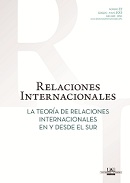Postcolonial approaches in International Relations: a brief overview of its debates and theorical developments
Keywords:
Postcolonial approaches , International Relations , Critic non-Western thought , theoryCopyright (c) 2013 Fernando GALINDO RODRÍGUEZ

This work is licensed under a Creative Commons Attribution-NonCommercial-NoDerivatives 4.0 International License.
Abstract
This article makes a brief analysis of International Relations (IR) discipline according to a postcolonial approach and aims to explain some central elements of this debate from a critical point of view, to the European and North American Western power constitutive of the IR and hegemonic in this field. In this sense, it discusses the state-focused nature, the genealogy and the purpose of the discipline, the legitimate places to produce knowledge, the self-referenced character as well as the rationalist division of the International subject. As a second goal, it proposes and explores a possible time segmentation of its development in the International studies, distinguishing three phases between its appearance and its actual situation: first from a cultural point of view, second with an economical policy and globalization approach, and at least from a geopolitical perspective.
Finally, it ends presenting some actual lectures and summarizing the main transitions occurring in this debate, underlining the achievements and limits of each phase. It emphasizes the heterogeneity of theoretical, methodological and political trends that motivate its advances and will likely impulse new theoretical development and non-occidental critical approach and/or anti-hegemonic point of view in this field.





